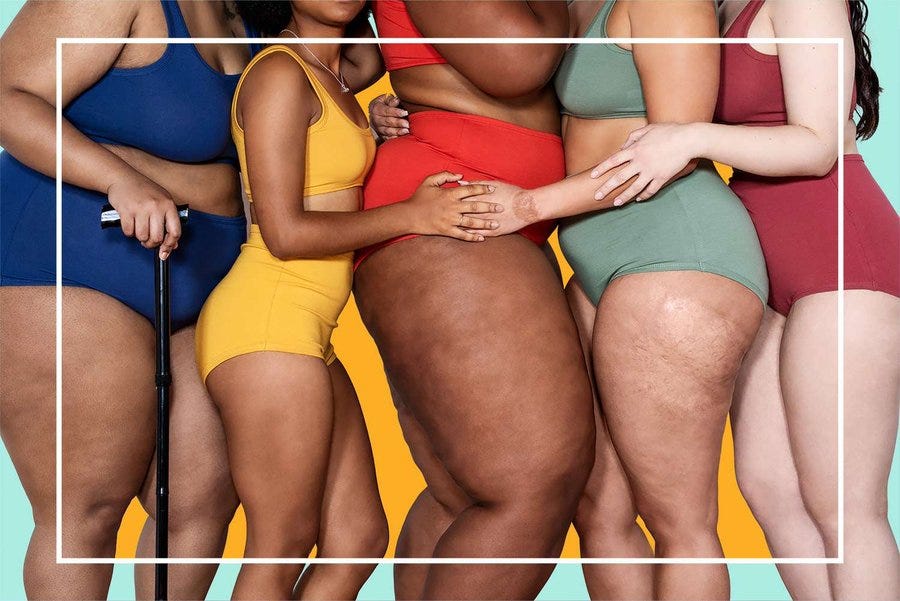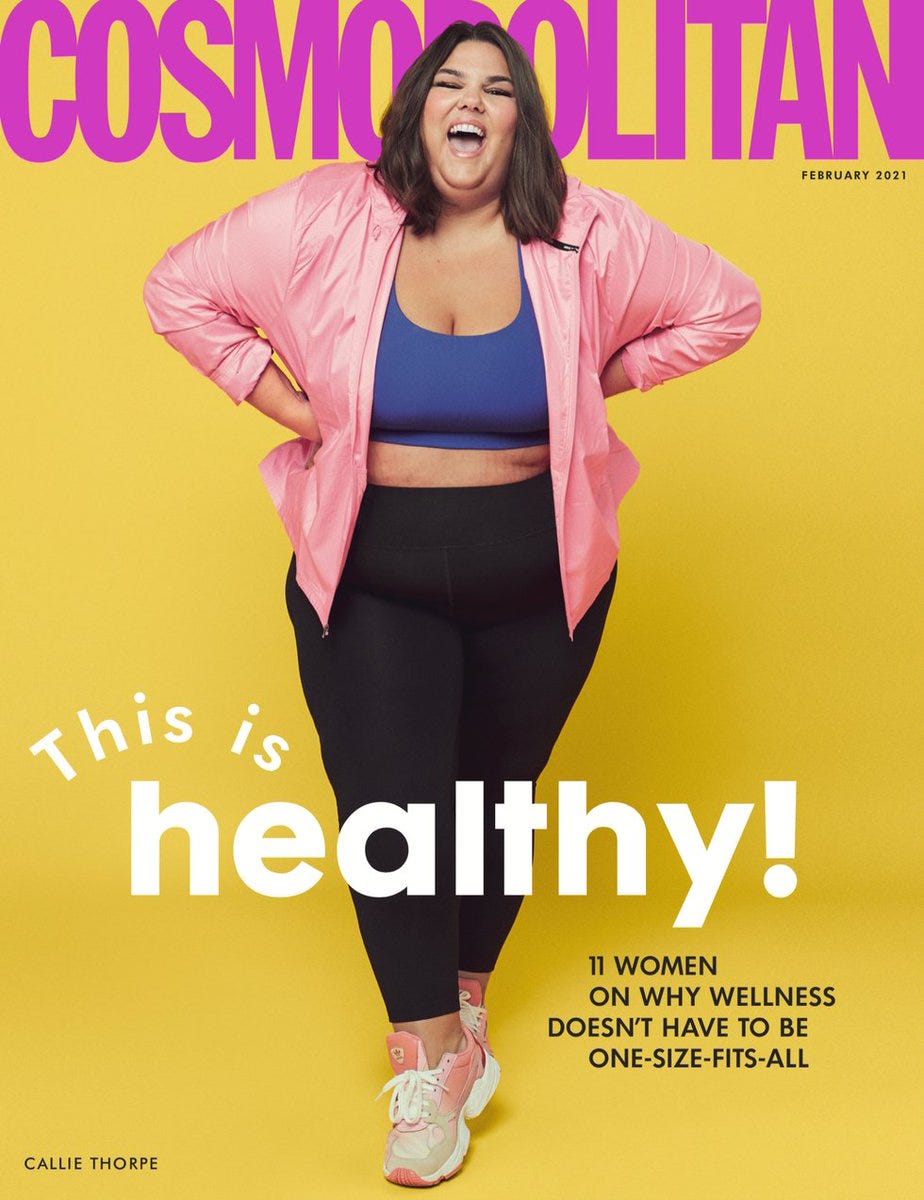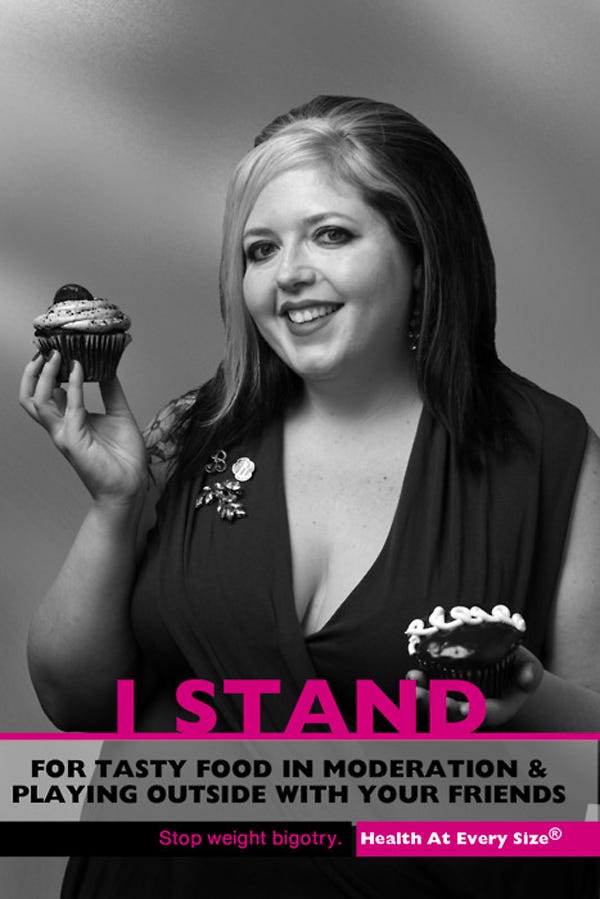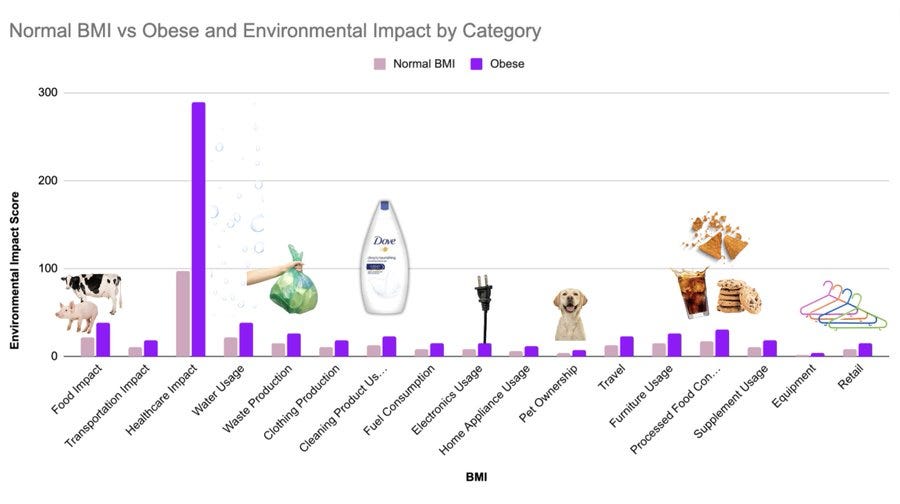The Obesity Epidemic, Body Positivity, and the Faux Self-Care Industrial Complex
A (Sorta) Critical Examination
Some thoughts I've been accumulating about the obesity epidemic and the body positivity movement, and their impact on this faux self-care industrial complex we're now experiencing.
First and foremost, let’s get an unambiguous definition of what “HEALTH” is: Health is a multi-dimensional state characterized not merely by the absence of illness but by physical, mental, and emotional well-being. It's a dynamic balance that involves nutritional adequacy, physical activity, cognitive stimulation, emotional resilience, and effective stress management.
While societal narratives often reduce health to aesthetic criteria like weight or muscle tone, true health encompasses metabolic efficiency, functional mobility, mental clarity, and emotional stability.
Now that we've established what health is, let's take a look at nutrition. Poor nutrition adversely affects your mental and physical state, leading to decreased productivity and overall well-being. It wreaks havoc on your sleep cycle, which is indispensable for cognitive function and emotional equilibrium. These nutritional choices set the tone for your long-term health. And regarding nutrition, less is more.
Amidst the myriad diet plans, workout regimes, and "revolutionary" supplements, the core principle of weight loss gets lost: it's a simple numbers game. You need to burn more calories than you consume. That's the crux of it. So ignore the buzzwords, sidestep the marketing gimmicks, and focus on the raw data. Calculate your Basal Metabolic Rate (BMR), factor in additional calories burned through physical activity, and aim for a caloric intake that's less than the sum. There's no alchemy here, just simple arithmetic.
Disregard the sensational promises of rapid fat loss through "innovative" techniques or "natural" supplements. These claims not only lack scientific backing but also muddy the waters of understanding. The only non-negotiable element in weight loss is a caloric deficit. The laws of thermodynamics do not care about fad diets. If you're not burning more than you're consuming, you're either maintaining or gaining weight, period.
Being in a caloric deficit doesn't automatically mean you should start obsessing over every calorie. The neurotic practice of tabulating every calorie not only fosters an unhealthy relationship with food but is also fundamentally unsustainable. Instead, cultivate an intuitive understanding of your body's needs. Learn to read your body's signals. Eat when you're hungry, not when you're emotional or bored. Your body is a finely tuned machine, not a garbage disposal.
Quick-wins do have a place here: start by ditching liquid calories. Sodas, fruit juices, and elaborate coffee concoctions are nothing but caloric minefields. And about those protein powders and "wellness" supplements — the only thing you're bulking is your calorie count. Remember, less, is, more. Now let's get into the thick of it, no pun intended.
The part that's been politicized and shoved down our throats by the body positivity movement, which advocates for "health at every size" (HAES), and says anyone who disagrees is either fat-phobic, or has "thin privilege."
For context, here is the description of HAES: HAES is a lifestyle that encourages healthy eating and enjoyable physical activity as a way to feel better and live longer. Unlike other programs, it does not believe weight loss through dieting is the way to become healthy. Shape magazine wrote about HAES: they aim to put an end to weight stigma. The below photo is one of the images from their article, praising HAES.
I came up with this analogy last year, we'll call it: Visual Markers of Choice and Consequence
Bear with me while I explain. Much like a sunburn serves as an unmistakable indicator of excessive sun exposure or inadequate sunscreen use, obesity often functions as a visual marker of caloric overconsumption. In both instances, what we see isn't just a physical state but a manifestation of choices made—or protections foregone. When you encounter someone with a sunburn, it's a safe assumption they've either spent too much time in the sun or neglected to use sufficient SPF.
Similarly, when you see an obese individual and you understand the fundamentals of caloric balance, you recognize that, at its core, this is a matter of surplus calorie intake. The visual symptom speaks to the underlying math.
The end result is fundamentally tied to simple, undeniable equations: calories in versus calories out, UV exposure versus skin damage.
And regarding "thin privilege," the term suggests that maintaining a healthy weight grants one societal advantages, which obscures the effort required to achieve that state. Labeling someone as having "thin privilege" often dismisses the discipline, choices, and sometimes sacrifices made to maintain a healthy weight. It's not a privilege if it's available to anyone who is willing to put in the effort. With that, here's an image from a HAES campaign:
The feminist and body positivity movements, fueled by the mantra that "the personal is always political," have unintentionally paved the way for a faux self-care industrial complex. While originally advocating for the acceptance and celebration of all body types, these movements have been co-opted to perpetuate a narrative that undermines the essence of genuine self-care.
The notion that every choice related to one's body is an act of rebellion or empowerment has obscured the fundamental objective of health: to enhance the likelihood of survival and enable individuals to thrive. In this distorted view, the focus shifts away from practices that foster real, tangible health benefits—such as maintaining a balanced diet, engaging in regular physical activity, and monitoring metabolic indicators.
Instead, the spotlight often falls on superficial, market-driven forms of "self-care": indulgent spa treatments, "guilt-free" gourmet desserts, and premium wellness products, to name a few. This shift not only misguides individuals but also trivializes the concept of self-care, turning it into a commodified experience rather than a lifestyle rooted in discipline and informed choices.
Authentic self-care involves acts that may not always be Instagrammable or aligned with popular sentiment. It means respecting your body enough to nourish it adequately, move it regularly, and rest it sufficiently—actions that directly contribute to your ability to survive and thrive.
By conflating self-indulgence with self-care and politicizing personal health choices, these movements inadvertently dilute the importance of genuine self-responsibility. In doing so, they divert focus from the science-backed, sometimes unglamorous practices that form the bedrock of real health and well-being.
Effective weight management is refreshingly simple. You don't need a pantry of exotic supplements or a premium gym membership. What you do need is a commitment to basic, good ol' science and a rejection of the weight-loss industry's misleading narratives. True empowerment is breaking free from these collective illusions and becoming a real, active co-author of your own story and life.
Before I wrap this up, I want to touch on one more topic that grinds my gears in this arena. Sustainability.
While the conversation around obesity is often framed in terms of appearance or social stigma, another pressing concern is its impact on overall health and longevity. Obesity is not merely a cosmetic issue; it's a condition associated with a plethora of medical complications, ranging from cardiovascular diseases to type 2 diabetes, from sleep apnea to certain types of cancer. Each of these conditions can significantly impair quality of life, reduce life expectancy, and increase healthcare costs.
Obesity puts an enormous strain on healthcare systems. The financial burden of treating obesity-related conditions is staggering, and the human resource allocation required to manage these chronic illnesses diverts attention and resources from other pressing healthcare issues. This is a societal issue, with implications that extend far beyond the individual.
Additionally, the lifestyle that often accompanies obesity is generally unsustainable in the long term. Frequent overconsumption of calorie-dense, nutrient-poor foods not only contributes to weight gain but also to metabolic dysfunction. Lack of physical activity exacerbates the issue, further increasing the risk of developing chronic conditions. As one ages, these risks multiply, making it increasingly difficult to transition to a healthier, more sustainable lifestyle.
The inconvenient truth is that obesity is often a symptom of a lifestyle that is out of sync with the biological and metabolic requirements of the human body. Furthermore, it's equally important to recognize the sheer unsustainability of an obese lifestyle from a societal and global perspective.
To put it plainly, an obese lifestyle is resource-intensive. The consumption patterns associated with obesity have far-reaching impacts that go beyond personal health and extend into the realm of environmental degradation and social inequity.
First, let's talk about food production. The greater caloric intake inevitably leads to higher demand for food, particularly meat and processed foods. This, in turn, has environmental consequences, including increased greenhouse gas emissions, deforestation, and water usage. More cows mean more methane, more feed crops, and more water consumption. Essentially, the environmental footprint of an obese individual is likely to be significantly larger than that of someone maintaining a healthy weight.
Second, there's the matter of healthcare economics, which I briefly touched on above. The elevated medical costs associated with treating obesity-related conditions aren't borne solely by the individual; they are often subsidized by society at large. In insurance pools, for instance, the costs get averaged out, meaning that those maintaining a healthy weight end up financially contributing to the treatment of obesity-induced illnesses. It's a form of invisible subsidy that's rarely acknowledged but has real economic implications.
Third, the resource consumption extends to the basics: more fabric for clothing, greater fuel consumption in transportation due to increased weight, and even more wear and tear on public infrastructure like seats, elevators, and sidewalks. While these might seem like trivial details, they add up when considered at a population level.
Obesity isn't just a personal or public health issue; it's a global sustainability concern. The habits and consumption patterns associated with obesity put strain not just on individual bodies but on the planet and society as a whole. Until we, as a society, can acknowledge and address these inconvenient truths, we are bound to continue down this unhealthy and unsustainable path. It's not just a matter of individual choices; it's a collective responsibility that has far-reaching implications for our planet, our economy, and our future.
The body positivity and faux self-care movements, while well-intentioned, have given us permission to ignore the real, tangible consequences of our lifestyles. They've made it socially unacceptable to discuss the obvious and scientifically proven impacts of obesity, not just on personal health but on society and the planet at large.
Ignoring the problem doesn't make it go away. Silence, in this case, is not just complicity; it's a form of denial that perpetuates the issue, rendering us all contributors to a problem that has systemic ramifications. We need to pivot from a culture of avoidance to one of awareness and action.
This involves not only redefining what true health and self-care mean but also considering the environmental, economic, and societal costs of our choices. It's time we prioritize genuine health—rooted in science and personal responsibility—over convenient narratives that serve only to placate our collective conscience while the world pays the price. And let's be clear: the price is far too high to ignore any longer.







"True empowerment is breaking free from these collective illusions and becoming a real, active co-author of your own story and life."
Brilliantly stated. This is a tough subject to broach, but you do it so matter-of-factly, it can't help but to be effective. I despise the current governmental coddling of those who suffer the inherent stigma which accompanies a person's quality of choices. It's just another example of society's modern solution for dealing with cultural and personal failure--lowering the bar.